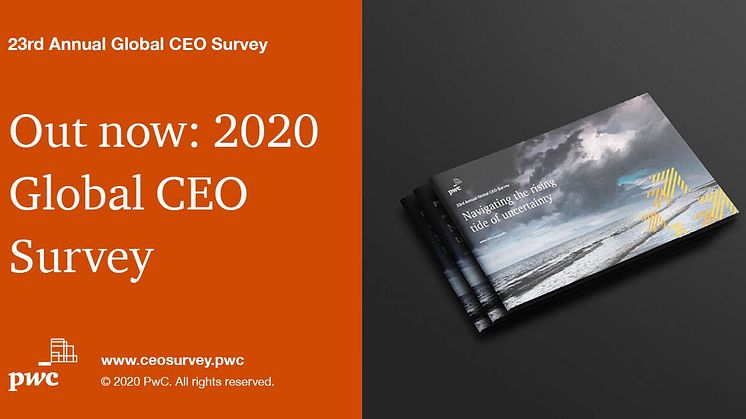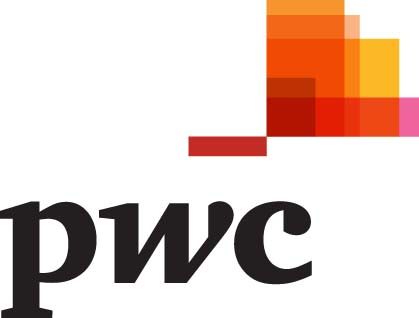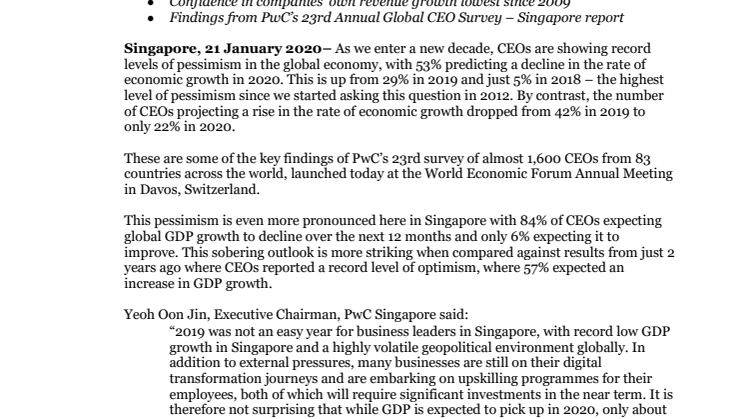
Press release -
CEO pessimism over global growth reaches record high
- CEOs in every region across the world predict slower economic growth
- Confidence in companies’ own revenue growth lowest since 2009
- Findings from PwC’s 23rd Annual Global CEO Survey – Singapore report
Singapore, 21 January 2020– As we enter a new decade, CEOs are showing record levels of pessimism in the global economy, with 53% predicting a decline in the rate of economic growth in 2020. This is up from 29% in 2019 and just 5% in 2018 – the highest level of pessimism since we started asking this question in 2012. By contrast, the number of CEOs projecting a rise in the rate of economic growth dropped from 42% in 2019 to only 22% in 2020.
These are some of the key findings of PwC’s 23rd survey of almost 1,600 CEOs from 83 countries across the world, launched today at the World Economic Forum Annual Meeting in Davos, Switzerland.
This pessimism is even more pronounced here in Singapore with 84% of CEOs expecting global GDP growth to decline over the next 12 months and only 6% expecting it to improve. This sobering outlook is more striking when compared against results from just 2 years ago where CEOs reported a record level of optimism, where 57% expected an increase in GDP growth.
Yeoh Oon Jin, Executive Chairman, PwC Singapore said:
“2019 was not an easy year for business leaders in Singapore, with record low GDP growth in Singapore and a highly volatile geopolitical environment globally. In addition to external pressures, many businesses are still on their digital transformation journeys and are embarking on upskilling programmes for their employees, both of which will require significant investments in the near term. It is therefore not surprising that while GDP is expected to pick up in 2020, only about one in four CEOs in Singapore are confident in revenue growth for the next 12 months.”
CEO confidence in own revenue growth declines
CEOs are also not so positive about their own companies’ prospects for the year ahead, with only 25% of CEOs in Singapore saying they are“very confident” in their own organisation’s growth over the next 12 months (27% globally, 29 in APAC).
When asked about their own revenue growth prospects, the change in global CEO sentiment has proven to be an excellent predictor of global economic growth. Analysing CEO forecasts since 2008, the correlation between CEO confidence in their 12-month revenue growth and the actual growth achieved by the global economy has been very close (see exhibit4 in notes). If the analysis continues to hold, global growth could slow to 2.4% in 2020 below many estimates including the 3.4% October growth prediction from the IMF.
Worries about uncertain economic growth on the rise
In 2019, when asked about the top threats to their organisation’s growth prospects, uncertain economic growth ranked outside the top ten concerns for CEOs globally at number twelve. This year it has leapt to third place, just behind trade conflicts – another risk that has risen up the CEOs agenda – and the perennial over-regulation, which has topped the table as the number one threat for CEOs globally.
In Singapore, trade conflicts[1] (97%) emerged as the top concern for CEOs followed closely by uncertain economic growth (94%) in second and then protectionism (88%). The top three concerns point towards the strong influence that the global environment has on Singapore as a globalised economy.
Globally, CEOs are also increasingly concerned about cyber threats and climate change and environmental damage, however despite the increasing number of extreme weather events and the intensity of debate on the issue, the magnitude of other threats continues to overshadow climate change which still does not make it into the CEOs’ top ten threats to growth.
Policing cyberspace
While CEOs around the world express clear concerns about the threat of over-regulation, they are also predicting significant regulatory changes in the technology sector. Globally, over two-thirds of CEOs (75% in Singapore) believe that governments will introduce new legislation to regulate the content on both the internet and social media and to break up dominant tech companies.
A majority of CEOs (51% globally, 59% in Singapore) also predict that governments will increasingly compel the private sector to financially compensate individuals for the personal data that they collect.
The upskilling challenge
While the shortage of key skills remains a top threat to growth for CEOs and they agree that retraining/upskilling is the best way to close the skills gap, they are not making much headway in tackling the problem with only 16% of Singapore CEOs (18% globally) saying they have made “significant progress” in establishing an upskilling programme.
Top challenges Singapore CEOs faced when it comes to upskilling were employees’ ability to learn new future skills (22%) and retaining up-skilled employees (19%). Despite the challenges around digital upskilling, there are visible signs of progress. A third of CEOs in Singapore said that upskilling programmes were very effective in driving greater innovation and accelerated digital transformation and two-fifths of CEOs reflected higher workforce productivity.
Yeoh Oon Jin, Executive Chairman, PwC Singapore says:
“In the quest forgreater innovation, transformation and productivity through upskilling of the workforce, a key factor for success is a clear plan that is strategically aligned to meet business needs. Organisations must clearly identify skills gaps and mismatches, build a future-proof skills strategy and lay the necessary cultural foundation. Without these building blocks in place, business leaders risk implementing programmes that are not in line with their future-proofing strategies.”
Climate change – challenge or chance?
Although climate change does not appear in the top ten threats to CEOs’ growth prospects, CEOs are expressing a growing appreciation of the upside of taking action to reduce their carbon footprint. Compared to a decade ago, when we last asked this question, CEOs are now twice as likely to “strongly agree” that investing in climate change initiatives will boost reputational advantage (30% in 2020 compared with 16% in 2010) and 25% of CEOs today compared with 13% in 2010 see climate change initiatives leading to new product and service opportunities for their organisation.
Views from CEOs in Singapore are even stronger with 50% saying they ‘strongly agree’ that there will be reputational advantages and 41% seeing new product and service opportunities.
However, for these opportunities to turn into long term success stories, the principles of climate change need to be embedded right across a businesses’ supply chain and customer experience.
ENDS
Notes:
[1]It should be noted that the survey was conducted in September and October 2019, before the US-China trade war deal signed in January 2020.
Read PwC’s 23rd Annual Global CEO Survey – Singapore Report at www.pwc.com/sg/ceosurvey-2020
Download the global report at ceosurvey.pwc. Video footage from the launch of the Global CEO Survey in Davos and other media materials are available at: press.pwc.com

PwC conducted 1,581 interviews with CEOs in 83 countries, of which 32 were from Singapore, between September and October 2019.
Our sample is weighted by national GDP to ensure that CEOs’ views are fairly represented across all major regions. 7% of the interviews were conducted by telephone, 88% online, and 5% by post or face-to-face. All quantitative interviews were conducted on a confidential basis.
46% of companies had revenues of $1 billion or more;35% of companies had revenues between $100 million and $1 billion; 15% of companies had revenues of up to $100 million; 55% of companies were privately owned.
Related links
Topics
Categories
About PwC
At PwC, our purpose is to build trust in society and solve important problems. We’re a network of firms in 157 countries with over 276,000 people who are committed to delivering quality in assurance, advisory and tax services. Find out more and tell us what matters to you by visiting us at www.pwc.com/sg.
PwC refers to the PwC network and/or one or more of its member firms, each of which is a separate legal entity. Please see www.pwc.com/structure for further details.
© 2019 PwC. All rights reserved



